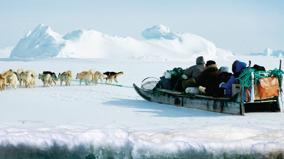The Wings of Johnny May
This feature documentary shines a spotlight on Johnny May, the first Inuit bush pilot in Nunavik—and a legend among his people. During the 34,000 hours of flight time he’s logged, May has lived through extraordinary adventures and has had a unique view of the transformation of the Arctic from his perch in the sky. He has watched as the Inuit went from nomadic life to a sedentary existence, and as climate change has melted the permafrost. But one thing remains constant: May’s deep love for his wife Louisa. Since his earliest days in the air, his plane has sported the …

Extras
Details
This feature documentary shines a spotlight on Johnny May, the first Inuit bush pilot in Nunavik—and a legend among his people. During the 34,000 hours of flight time he’s logged, May has lived through extraordinary adventures and has had a unique view of the transformation of the Arctic from his perch in the sky. He has watched as the Inuit went from nomadic life to a sedentary existence, and as climate change has melted the permafrost. But one thing remains constant: May’s deep love for his wife Louisa. Since his earliest days in the air, his plane has sported the same Inuktitut message for her: "Pengo Pally", which means “I miss you.” The Wings of Johnny May is an airborne documentary that highlights a unique culture through the eyes of an exceptional man.
-
screenwriterMarc Fafard
-
directorMarc Fafard
-
narratorJames Hyndman
-
additional voiceoverMarie GignacJack Robitaille
-
researchMarc FafardMarie-Eve Lalancette
-
photo researchÉtienne Hansez
-
archival film researchÉtienne Hansez
-
director of photographyPaul-Anthony MilleDominique Delapierre
-
camera assistantJulien MalichierSébastien AlcazarBrigitte Pesquet
-
data wranglerFrancis HannemanLawrence Lafetière
-
sound recordistPierre BouchardSimon GouletSteven EjbickNormand Lapierre
-
editorAlain Baril
-
featuringJohnny MayLouisa Berthe-MayJean DésyWhit FraserMary SimonSara May-TagoonaWilliam Tagoona
-
translationMaaki Putulik
-
aerial key gripClaude Fortin
-
helicopter pilotPeter Duncan
-
3D online post-productionFlyingS3D
-
3D coordinatorAudrey Bourdiol
-
stereoscopic editingFlyingS3D
-
3D harmonizationPierre Sudre
-
digital colouristPierre Sudre
-
green screen keyingFlyingS3D
-
3D rushes managementLink's productions
-
trailerJérémy Leroux
-
subtitlingCamille MoninPierre Sudre
-
2D-3D conversionAlain BarilNicola LamoureuxFrançois Mercier
-
audio post-productionStudio Expression
-
sound editorSimon De GrandpréMarc Carrier
-
sound designerJérôme Boiteau
-
mixerJérôme Boiteau
-
sound edit coordinatorJosée HarpinIsabelle Dupéré
-
music composerCamille Delafon
-
orchestrationCamille Delafon
-
conductorCamille Delafon
-
solo violinSébastien Surel
-
solo celloCyrille Lacrouts
-
pianoCamille Delafon
-
guitarJean Gillet
-
music recording studioStudio Ferber
-
music mixingStudio Bastille
-
sound engineerAlban Sautour
-
music contractorChristophe Briquet
-
music contractor assistantCathialine Zorzi
-
score coordinatorXavier Forcioli
-
music preparationNorbert Vergonjanne
-
production managerGeneviève Leclerc
-
post-production managerGeneviève Leclerc
-
production assistantÉtienne Hansez
-
post-production coordinatorStéphanie Lamontagne
-
funding coordinatorGeneviève LeclercGeneviève Dionne
-
editing technicianDenis Lavoie
-
administratorRoxane-Caroline DoironAlexandrine Torres de FigueiredoSia Koukoulas
-
accountantRoxane-Caroline Doiron
-
administrative assistantMarie-Eve LalancetteVanessa Emam
-
marketing managerFrançois Jacques
-
marketing manager - assistanceGeneviève Bérard
-
technical coordinatorDaniel Claveau
-
storyboard artistFrancis Desharnais
-
director of animationNicola Lemay
-
art directorDidier Loubat
-
designerDidier Loubat
-
modelingZane Kozak
-
riggingZane Kozak
-
stereoscopyZane Kozak
-
technical directorZane Kozak
-
3D animatorMartin FerlandJonathan Ng
-
texturesStephan Ballard
-
lightingTimothy Dormady
-
animationDale Hayward
-
computer graphicsStephan BallardTimothy DormadyDale Hayward
-
special effects consultantÉric Gervais-Després
-
digital imaging specialistPierre Plouffe
-
animation producerMarc Bertrand
-
legal advisorStéphanie L'Écuyer
-
collection managementMary Graziano
-
distribution rights managementMary Graziano
-
production supervisorJean Michel Quilici
-
production teamFiora LumbrosoElsa MoleyGrégory GermakianSandrine RouxAnna MedziewskiJérémy LerouxVictor LimaJulie HednaJoséphine FontainePauline BoyerSacha Subramaniam
-
post-production teamAdeline LetortAudrey PontoizeauCyrille SolovieffJustine Quesnoit
-
legal affairsBérengère Edeline
-
legal affairs - assistantEmilie RenardColin Vettier
-
administrator accountantSandrine Melki
-
administrator accountant - assistantDominique AzarMaximilien Billeret
-
legal counselMarie-José Harel
-
producerYves FortinJacques TurgeonMonique SimardDavid KodsiJan Vasak












